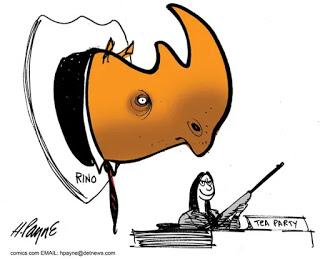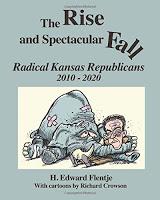 [This is a somewhat expanded version of a piece that appeared in the Wichita Eagle over the weekend; I received an e-mail on Sunday which causes me to think more about what I mean by "moderation," and this is the result.]
[This is a somewhat expanded version of a piece that appeared in the Wichita Eagle over the weekend; I received an e-mail on Sunday which causes me to think more about what I mean by "moderation," and this is the result.] A few weeks after the dust settled from the 2020 elections here in Kansas, I was giving an online presentation on the election results to the local chapter of the League of Women Voters. Many of the virtual participants had good questions, but the most common one was some variation on a question that has been a constant here in Kansas, and elsewhere, for decades now: “Whatever happened to moderate Republicans?” It's a good question, thought obviously not a new one.
That the parties--both following and, not frequently, shaping the voters which support them--have become more polarized over the past generation is well-supported. I think the only people who can honestly say today, as I think could be at least plausibly claimed in the 1990s, that there is "no real difference between the two major parties," are people deeply committed to revolutionary or reactionary causes--everyone else clearly understands that, in both marginal and major ways, elections have consequences. And it follows, therefore, that when you see party positions become less variable and flexible, and more tightly wound around ideological poles distant from each other, that's going to have consequences for governance. It is those consequences--and specifically, in Republican-heavy Kansas, the consequences of the state Republican party having become inhospitable for the moderates and liberals who once found shelter within it--which had my good-government-concerned interlocutors most worried.
Kansas's strongly Republican (and, yes, "conservative," but actually, for reasons of history, it's even more a matter of party than ideology) majority has been in place for many decades. But for a good number of those decades the state Republican party was a fairly crude instrument, one that contained diverse factions, but those factions could be played off one another, allowing for a degree of elite management. I use "management" there purposefully, because that is--for many observers of elections and the processes by which parties serve as the machines which transform, through representative elections, voter preferences into actual legislative and executive action, anyway--exactly what is presumably demanded: managers who, through the judicious orchestration of the mechanics by which voters and candidates produce majorities which can pass bills and enforce laws, do their best to make certain that those majorities are in respectable, balanced, or above all "moderate" ways.
More often than not, those who found themselves in the role of managers were various moderate and liberal Republicans, politicians and donors and strategists who worked hard to connect with--and, by so doing, cultivate--a particular kind of Republican voter. This isn't anything unique; this type of Republican--mostly suburban, mostly college-educated, and mostly committed to the success of their local public schools and other civic organizations--was the backbone of state Republican parties for decades all across the country. These voters (and in Kansas, you found them overwhelmingly in the suburban and exurban communities which surrounded Kansas's cities, and hence the largest numbers of them were found in northwestern Kansas, in and around Kansas city) faithfully supported the GOP, but they also often protected and rewarded those who dissented from any strictly conservative or libertarian ideological line. The result was a consistent majority party that nonetheless remained somewhat flexible, with many elected representatives who tended to move left or right as the times warranted.

Ed Flentje was a long-time Wichita State University professor, a scholar and a gentleman whose place as a regular column writer for Kansas newspapers I had the honor to take over. One of his great themes over the years was to trumpet this historical happenstance in the history of Kansas's political parties as one of the primary virtues of politics in the Sunflower State. We are a state with a decided (more than 2-to-1) Republican majority among voters, thus providing stability and predictability. At the same time, this Republican majority was divided enough between moderates and conservatives that a crucial number of its elected representatives could, from one issue to the next, ally with the minority Democrats or with the more conservative part of the Republican majority in the legislature, thus allowing the party to adapt, innovate, and pursue good government policies, even progressive ones on occasion. This is, Flentje strongly implies, the best of both wolds: consistent Republican party leadership, but a Republican party that regularly had moderates like Dick Bond and Bill Graves and Jean Schodorf leading the way. So thorough was the managing power of this party faction over the decades that the representatives elected by strongly conservative voters--whom, in the wake of the Summer of Mercy and the movement of Wichita, Kansas's largest city, to the right, probably constituted the majority of Kansas Republicans--were themselves seen as the small, trouble-making faction: "Republican rebels" who messed with the state party's commitment to be "the party of government," as Burdett Loomis, another long-time observer of Kansas politics, once put it.

In the introduction to a recent collection of his newspaper writings, Flentje remains confident that the patterns he often defended still hold. The collection includes ten years of columns which follow the path of Sam Brownback as he thoroughly remade the Kansas Republican party, driving out moderates in political primaries throughout his first term as government, and embarking on a fiscal revolution that had terrible consequences for our state. Though the “Brownback Revolution” took the Kansas Republican party, and thus the state government, in what he recognizes as an immoderately right-ward direction for a time, he sees that as a historical aberration, and believes the moderate Republican faction--who were essential to Governor Laura Kelly’s election in 2018--will continue to provide balance. He says this, while noting at the same time that he writes as one who is almost certainly a "RINO" (Republican In Name Only) in the eyes of many of his fellow Kansas Republicans, and also noting that moderates need to do their job as managers of the center of the party better ("grassroots politics will require tending" is his observation). Nonetheless, his commitment to the value of elite party management, of working to promote and fund campaigns and narratives which will put moderate Republicans in a deal-making, compromise-finding position, remains firm.
I don't dispute the value of Flentje's determination, given the convoluted ways that we have historically gotten our nation-wide, representative, two-party system we have. The United States was filled with various informal state-based party arrangements which functioned in mostly moderate ways--even though that regularly involved the exclusion of small segments of the local electorate--throughout the 20th century. But those arrangements may no longer hold. The 2020 election delivered a Republican majority to the Kansas House almost exactly the same as the one which existed when Sam Brownback was first elected governor a decade ago, and that similarly defiant, un-moderate, Trump-centric campaigns led to Republican wins in Congress and state legislatures across the nation, perhaps it is the rather election of Kelly two-years ago, an election made possible by Republican crossing over to vote a Democrat, that will someday be seen as an aberration here in Kansas from the new, 21st-century style of party politics.
What is that style? It is, most of all, a nationalized one. Regional variations that once characterized American politics are dying out. Flentje and others long presumed that state parties were capable of local adaptation, and continued to believe so--as recently as 2014, despite the changes which the Tea Party had by then spent carrying out (some would say "hollowing out") with the national Republican party, Flentje still suggested that Kansas Democrats take a page from the playbook of Democratic Kansas Governor Bob Docking and explicitly rebuke the national party, signing off on the winning strategy of tying his re-election in 1972 to Richard Nixon's. This year, Kansas Democratic senate candidate Barbara Bollier's similar strategy, which included explicitly highlighting voters who intended to vote for her and President Trump, obviously didn't work nearly so well.
The nationalization of American politics has many sources. There is growing congressional dysfunction, the result of campaign finance rules and the way in which ideologically committed interest groups have captured political primaries, which has allowed (or even encouraged) presidents, our only nationally elected figure, to claim, as a matter of necessity, more and more executive power. There is the growing homogeneity and finance-centered character of the America's service economy, with powerful corporations, increasingly distanced from the variable work of actual production (since natural resources from which things can be produced naturally vary around the globe), imposing a kind of accidental uniformity of interests which makes ideology much more appealing way of eliciting voters' attention than traditional political log-rolling. But today, in particular, I think of my old friend Damon Linker's recent--and excellent--two-part essay on how media technologies are turning the tools by which party elites once kept populist extremes at bay against those same managers. His conclusion to the first part is striking:
[This is] what social media does: It allows for the constructing of identities and the cultivation of resentments in a virtual space among likeminded people separated by vast distances in the physical world. Instead of [James] Madison's highly differentiated republic of discrete communities with their own regional, factional interests--or the kind of slow-motion grassroots organizing we saw in the real world during the mid-20th century--we have new forms of rapid-fire, technologically facilitated solidarity among tens of millions of Americans separated by hundreds or thousands of miles but united by a sense of shared grievance and a commitment to lashing out against its sources, real and imagined.
In short, in a centralizing world of instantaneous communication, ideological slights and crusades, whether real or perceived, can amass a movement overnight--and apparently many voters, fearful of being represented by their ideological opponents (or so their news feeds depict them), follow along. Party leaders and donors are, predictably, sensitive to this, start operating on the basis of it, and perhaps are even happy to do so. Why would that be? Obviously, people whose political preferences cannot be easily packaged in a particular ideological construct are frustrated: their swing-vote tendencies are making them less and less important, particularly in states like Kansas, where one-party dominance is mostly unquestioned. But it's not unreasonable to suppose that a good many people in those areas of local dominance have long chafed at the management they've experienced, and wanted real contestation to take its place. The fact that the breaking of this state-specific Republican status quo was primarily due to national, to say nothing to global, movements and technologies is a frustrating irony for believers in participatory and local democracy like myself. Still, unlike some, I can't pretend that I see the eclipse of the cult of anti-populist moderation as entirely bad thing. Bad for Kansas state policies, its taxes and programs and civil society? Absolutely! But bad for Kansas's democratic health? There, I think I mostly agree with Ezra Klein, who draws upon research showing the degree of ideological and historical randomness out of which the label "moderate" emerges, and concludes that frequently the moderate label is "little more than a tool the establishment uses to set limits on the range of acceptable debate." In this jerry-rigged national political system we call our constitutional order, the conviction that there is something fundamentally wrong or illegitimate with ideologically unified and disciplined parties--if that is, in fact, the direction we're going--seems a step too far, to me.
Of course, 2020 was just one election. Who knows how the Republican party will evolve once Trump, whose constant Twitter declarations overwhelmed potential intra-party factions, is out of the White House? There's no good reason to believe that we'll see a complete return to some idealized 20th-century American "normal," but it may that at least a couple surviving moderate Republicans up in the northwest corner of Kansas may find themselves not quite so pressured to either abandon or conform to their party. Still, that's a slim possibility at best. More likely, we here in Kansas may need to start assuming that nationalized, polarized, and deeply divided parties are all we have for turning voter preferences into successful public policies.
That isn’t necessarily impossible; parliamentary democracies, with their “loyal opposition” and “shadow governments,” do it all the time. But that, obviously, involves a great deal of structural adaptation, the sort of thing that would have to emerge over time as parties confront more directly their paralyzed reality, and slowly shake off the deeply ingrained belief that "one more election" could make the difference in squelching their intra-party opponents. How to create such governing forms in Republican-heavy Kansas, however, where deal-making moderates were so central to the whole idea of good government for so long, is far from clear. So I guess I'd just conclude with this, speaking hypothetically here to those who asked me where the moderate Republicans had gone. Let's say times have changed, technology has changed, funding has changed, and that for all those reasons the times wherein moderate voters would regularly send a sufficient number of dissenters and adapters to Topeka under the Republican party, such as would necessitate compromise, are at an end. Figuring out how to enable our state government to work as it once did without that party crutch has to be job number one.
